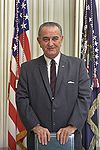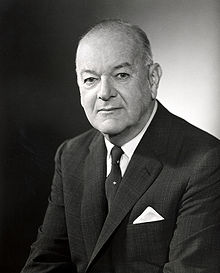- C. R. Smith
-
Cyrus Rowlett Smith (September 9, 1899 – April 4, 1990), known throughout his life as C. R. Smith, was the CEO of American Airlines from 1934 to 1968 and from 1973 to 1974. He was also United States Secretary of Commerce for a brief period under President Lyndon B. Johnson.
Contents
Business career
Born in Minerva, Texas, Smith attended the University of Texas despite never having graduated from high school. Upon graduation, Smith worked as an accountant for the accounting firm of Peat Marwick Mitchell and later ran a number of businesses, including a Western apparel store and a firm that sold state records of new mothers to manufacturers of baby supplies. He joined Southern Air Transport as a vice president in 1929, and through a series of mergers SAT became part of American Airlines. In 1934, he became president of American Airlines.[1]
In business, he was known for an informal, no-nonsense leadership style that stressed close relationships with both executives and employees. Convair president Jack Naish noted that "you can close a $100 million deal on his word alone." He generally communicated through personally typed one-page memos. Smith was said to know every American employee by name until the end of his first term as CEO. He fostered a close relationship with Douglas Aircraft that led American to become a key adopter of the Douglas DC-3 and DC-6: he was also one of the early proponents of what is now LaGuardia Airport in New York City.
One of Smith's most famous acts was the publication of an advertisement entitled "Why Dodge This Question: Afraid To Fly?" in 1934. Airline safety had been a taboo subject at the time, and Smith was credited with being the first airline manager to discuss it openly with the public. [2]
During World War II, Smith left American to become a colonel in the United States Army Air Forces, eventually rising to the rank of major general in the Air Transport Command; he immediately left the AAF in 1945 and returned to his airline.
Following the war, Smith dabbled in international air travel through American Overseas Airlines. He also set up the Admirals Club, the first airline lounge system. In the 1950s, he helped American become the first domestic jet carrier in the US by selecting the Boeing 707 aircraft, which came out months before its rival Douglas DC-8.
Smith left American in 1968. He returned in 1973 following a period of corporate mismanagement and scandal, although he retired again less than a year later, stating that he was "working in a 747 era with a DC-6 state of mind." In 1976, Smith was the recipient of the Tony Jannus Award for his distinguished contributions to commercial aviation.
Political career
Smith was close friends with many prominent Texan politicians, including Lyndon B. Johnson, Jesse Jones and Sam Rayburn. His friendship with the former was the principal reason for his accession to the Cabinet in 1968. However, he often clashed with the civil service because of his aversion to bureaucracy: on his first day, he objected to having four secretaries and asked that three of them be fired. This culture shock caused him to leave his post early and enter a first retirement.
He died in Washington, D.C., and is buried in Arlington National Cemetery.
Honors
The American Airlines C. R. Smith Museum in Fort Worth, Texas, is named after him.
Mr. Smith was inducted into the Junior Achievement U.S. Business Hall of Fame in 1976.
See also
References
- "Jets Across the U.S.," TIME, November 17, 1958.
External links
Political offices Preceded by
Alexander Buel TrowbridgeUnited States Secretary of Commerce
Served under: Lyndon B. Johnson
March 6, 1968 – January 19, 1969Succeeded by
Maurice StansUnited States Secretaries of Commerce Secretaries of Commerce & Labor Secretaries of Commerce Redfield • Alexander • Hoover • Whiting • Lamont • Chapin • Roper • Hopkins • Jones • Wallace • Harriman • Sawyer • Weeks • Strauss • Mueller • Hodges • Connor • Trowbridge • Smith • Stans • Peterson • Dent • Morton • Richardson • Kreps • Klutznick • Baldrige • Verity • Mosbacher • Franklin • Brown • Kantor • Daley • Mineta • Evans • Gutierrez • Locke • BrysonCabinet of President Lyndon B. Johnson (1963–1969) Vice President 
Secretary of State Secretary of the Treasury Secretary of Defense Attorney General Postmaster General Secretary of the Interior Secretary of the Agriculture Secretary of Commerce Luther H. Hodges (1963–1965) · John T. Connor (1965–1967) · Alexander Buel Trowbridge (1967–1968) · C. R. Smith (1968–1969)Secretary of Labor Secretary of Health, Education and Welfare Anthony J. Celebrezze (1963–1965) · John William Gardner (1965–1968) · Wilbur Joseph Cohen (1968–1969)Secretary of Housing and Urban Development Secretary of Transportation Categories:- 1899 births
- 1990 deaths
- United States Secretaries of Commerce
- Burials at Arlington National Cemetery
- American Airlines
- American military personnel of World War II
- United States Army Air Forces generals
Wikimedia Foundation. 2010.


